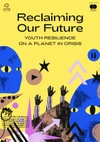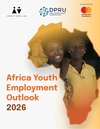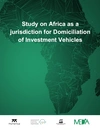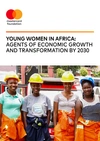Doing justice to the stories of African youth’s lived realities, individual pathways and hurdles is no easy task.
In fact, we would go as far as to say it is impossible. The only way to make the impossible possible – in the case of this report and its accompanying products, but also as an overarching lesson for projects centred around young people – is quite literally to let go of the writing pen. Embracing co-ownership of this project’s steering wheel throughout its entire process, from data collection to final launch, has been an equally instructive and enriching experience. While the outcome is something we are deeply proud of and hope to build on in the months and years to come, the past months of constant exchange and learning with the young people involved in this report have been the true gift.
This project has its roots in the biggest challenge of our generation – the climate crisis threatening to cause upheaval in every part of the world and for every aspect of daily life. As we watch the irreversible impacts of this crisis unfold, some truths are making themselves known to us: The African continent, while having historically contributed almost nothing to carbon emissions, is disproportionately affected by their impact on our biospheres, weather and environment. Young people are amongst the most vulnerable to these changes, often battling marginalisation, exclusion from decision-making spaces and intersectional discrimination all at once. But we also know that youth are at the forefront of climate activism, locally-led climate action and awareness campaigns. They are working tirelessly to help their communities adapt to and prepare for changing conditions and looming difficulties, all while doing their best to mitigate the damage which is already being inflicted on them.
The young people who made this report come to life tell stories from all areas of life: from the tough realities of farming collectives and the efforts of community-led mangrove reforestation, to educational workshops for young women and girls, to technological innovations including carbon capture and creative ideas for repurposing and recycling that you might have never heard of before. These stories are a testament as much to the young people’s industrious and creative minds as they are to the hardship they are facing on their respective paths. The weapon with which they are tackling these challenges, fostering it in their surroundings and practicing it against all odds, is their interpretation of resilience. Resilience has many faces. Exploring the ways in which it gets expressed by African youth across the continent as they combat the climate crisis has been a real privilege and a fascinating journey for us and our teams. We hope you enjoy the tales in this report as much as we did when we first got to hear them.
Our deepest gratitude goes out to the 17 young African people we got to work with for this report. They have shaped its content and altered the outcome of this project in ways we could have not foreseen, and could not cherish more.
We are hoping that the lecture of this report will guide readers further to the online platform we have created. We encourage you to engage with it and to contribute to it. Resilience is only as strong as the networks we create.
Olumide Abimbola (APRI – Africa Policy Research Institute)
Engage with this collaborative report through an interactive website experience: Youth Resilience on a Planet in Crisis
Youth Stories of Climate Resilience - An Africa Hour Mini Series Podcast
How would you define resilience? And what role does it play in your day-to-day life? Those are some of the questions we asked young Africans from various sectors - agriculture, tech, education, activism, and more. APRI - Africa Policy Research Institute, in collaboration with Mastercard Foundation, talked to African youth from across the continent to find out what resilience on a planet in crisis means to them. Five of them present their individual stories here, and dive into the challenges, moments, epiphanies and tools that shaped their path to where they are today.





